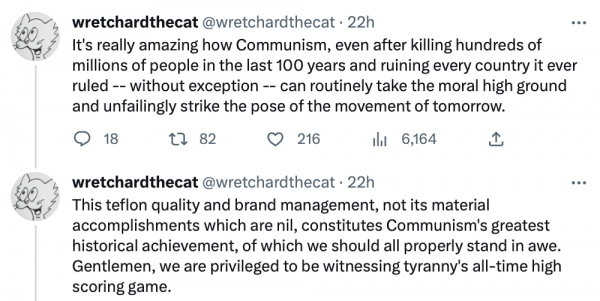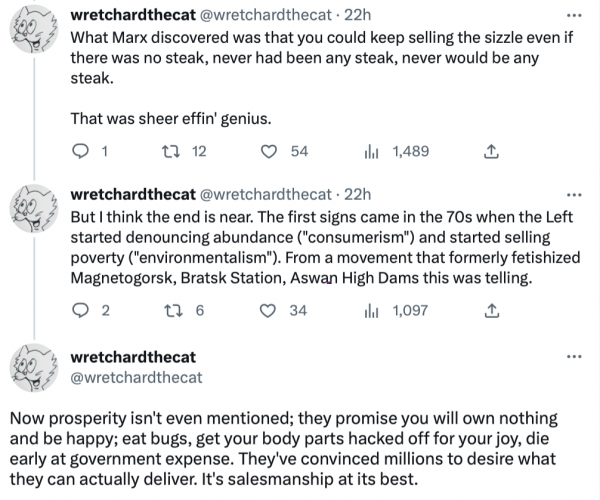MEAT: IT’S WHAT’S GOOD FOR YOU. New antioxidants found in beef, chicken, and pork!
Archive for 2023
February 19, 2023
RESETTING THE BAR: Jimmy Carter Was a Better President than You Think.
To fight stagflation, Carter appointed tight-money advocate Paul Volker to head the Federal Reserve Board, and Volker pulled the brakes on inflationary monetary policy — hard. It solved inflation but sent the economy into a painful correction that probably cost Carter reelection.
And despite his personal big government sympathies, Carter’s most lasting legacy is as the Great Deregulator. Carter deregulated oil, trucking, railroads, airlines, and beer. (H/t Caleb Brown.)
At the Atlantic, Derek Thompson chronicles the dramatic and almost unnoticed impact of Carter’s airline deregulation over the last thirty years. The bottom line: per-mile ticket prices fell by over fifty percent. And the results have transformed American social life and travel:
— In 1965, no more than 20 percent of Americans had ever flown in an airplane. By 2000, 50 percent of the country took at least one round-trip flight a year. The average was two round-trip tickets.
— The number of air passengers tripled between the 1970s and 2011.
— In 1974, it was illegal for an airline to charge less than $1,442 in inflation-adjusted dollars for a flight between New York City and Los Angeles. On Kayak, just now, I found one for $278.The impact of beer deregulation has been similarly overlooked: In 1978, the USA had just 44 domestic breweries. After deregulation, creativity and innovation flourished in the above-ground economy. Today, there are 1,400 American breweries. And home brewing for personal consumption is also now legal.
As for civil liberties, Carter also signed the most significant reform of government surveillance powers since World War II in the original FISA Act, and in 1979, he called for the decriminalization of marijuana, well ahead of the cultural and political curve. His legacy is also significant for what he did not do: he did not start any wars.
As P.J. O’Rourke wrote in his classic 1993 American Spectator article, “100 Reasons Why Jimmy Carter Was a Better President than Bill Clinton:”
98. Carter let the Soviets have Angola, Ethiopia, and South Yemen. And, in retrospect, the Soviets deserved no better.
99. Carter wasn’t a throwback to the Carter era.
100. And let us not forget that Jimmy Carter gave us one thing Bill Clinton can never possibly give us—Ronald Reagan.
Perhaps as a result of that last item, it’s after Carter left the White House, that he really began to lose the thread, as Jay Nordlinger wrote in his classic 2002 NRO article, “Carterpalooza!”
In a 1997 op-ed piece entitled “It’s Wrong to Demonize China” (also for the New York Times), Carter wrote — and forgive the awkward prose — “American criticism of China’s human rights abuses are justified, but their basis is not well understood. Westerners emphasize personal freedoms, while a stable government and a unified nation are paramount to the Chinese. This means that policies are shaped by fear of chaos from unrestrained dissidents or fear of China’s fragmentation by an independent Taiwan or Tibet. The result is excessive punishment [excessive punishment!] of outspoken dissidents and unwarranted domination of Tibetans.”
Carter said that “ill-informed commentators in both countries have cast the other side as a villain and have even forecast inevitable confrontation between the two nations.” You see the exquisite moral equivalence between a giant and repressive Communist state and the American republic. He then said, “Mutual criticisms are proper and necessary [mutual criticisms, mind you: Communist China, America . . .], but should not be offered in an arrogant or self-righteous way, and each of us should acknowledge improvements made by the other.” Carter arrogant or self-righteous, ever? Improvements made by the United States, too?
That’s what Xi said.
ROGER KIMBALL: A Modest Proposal for Transforming the Universities. “The entire apparatus can be restaffed and employed to help dismantle all the bogus, intellectually vacuous programs, departments, and initiatives whose sole purpose is to foster permanent grievance.”
ANNALS OF LEFTIST AUTOPHAGY: LOL: The Left eating the Left is on the menu as Code Pink crashes Biden’s DC dinner.
DEAL OF THE DAY: WUBEN C3 Flashlight 1200 High Lumens Rechargeable Flashlight. #CommissionEarned
THE LEFT DOESN’T MIND THREATS AND VIOLENCE, SO LONG AS THEY CONTROL THE SOURCE: Professor cleared of Islamophobia says he fears for his safety.
#JOURNALISM: Shock! WaPo lied about Elon Musk. “The Washington Post devoted prime real estate and TWO reporters to the story, clearly investing significant resources to spread the rumor. The Jeff Bezos-owned propaganda outlet–quite the irony there–couldn’t let the opportunity to dunk on Musk escape, even if they had to ignore facts. With two reporters you think they could bother to actually investigate the claim. But no. That would be reporting, not spreading a convenient narrative.”
LIGHTNING DEAL: Compressed-Air-Duster-Electric-Air-Duster for Computers. #CommissionEarned
GAS STOVES A DEADLY THREAT, CHEMICAL SPILLS FINE: Biden EPA Administrator’s Advice to Chemical Poisoning Victims in East Palestine, OH, Sounds Like Cruel Parody.
MOST LATE-NIGHT “COMEDY” IS JUST LECTURES FROM HUMORLESS SCOLDS: The Reactions to Greg Gutfeld’s Super Bowl Ad Display Exactly Why They Are Losing to Him.
PRESSURE WORKS: New Hampshire school reverses “urinal ban.”
Make this kind of stuff painful, and they’ll stop doing it.
February 18, 2023
THOUGHTS ON OUR RULING CLASS MONOCULTURE, AND WHAT TO DO ABOUT IT, over at my Substack. With a request for further thoughts.
I’M NOT WORRIED, PETE BUTTIGIEG IS ON IT:
@cannagrammy Repost bc only 20 views….. #MMJismyMAT #uspolitics #wakeup #profitsoverpeople #norfolksouthern #lexington #lexingtonky #birds ♬ original sound – cannagrammy
OPEN THREAD: Carry on.
PROFESSOR CARRINGTON, CALL YOUR OFFICE: Sun unleashes massive X2-class solar flare during geomagnetic storm watch (video).
REALITY’S LAST STAND: “DEI Is Destroying My University.” (Mine too. Join the club.)
COMMUNISM IS A DISEASE:


But like all viruses, it needs receptors to get inside. What aspects of our culture does it bind to?
UPDATE: A friend messages:
Re communism. It’s because young people are idealists, and believe history is not relevant to them, because they invented everything when they discovered it. Including communism.
It’s because people in bubbles like academia are sheltered enough that by and large they maintain youthful delusions.
It’s because powerful people, never subject to the strictures of the policy they push, have long recognized that that the false compassion socialism and communism cloak themselves in are useful tools for gaining, maintaining and expanding their power.
To the young, the world is new. It is being experienced for the first time. Communism and socialism speak to their notions of fairness.
Capitalism, property, the rights of other people who are not like them sound like something old people who never experienced this amazing new world talk about.
Pretty much.
GOOD QUESTION: “What might our world look like today if energy production had fully nuclearized — first fission and then maybe fusion — as many proponents in the immediate postwar decades predicted last century? The 1973 global oil shock led France on March 6, 1974, to announce a massive nuclearization program, such that today the country gets 70 percent of its power from nuclear. And what if other nations had followed suit?”
